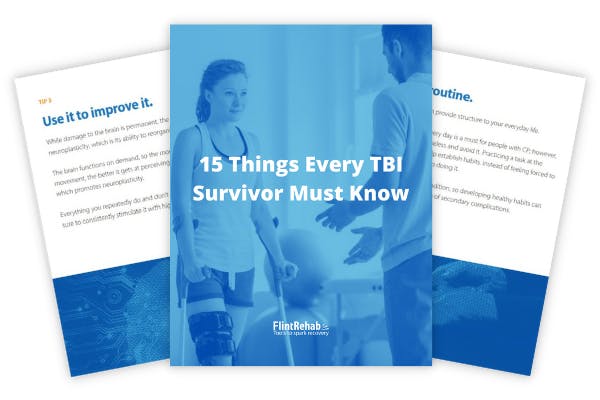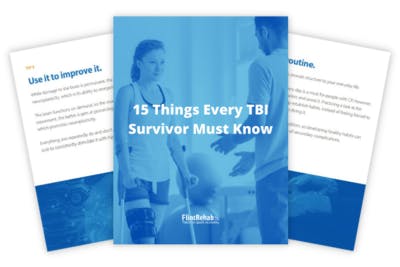No products in the cart.
No products in the cart.
No products in the cart.
No products in the cart.
Home » Neurological Recovery Blog » Traumatic Brain Injury » Cognitive-Behavioral Therapy After Traumatic Brain Injury: Benefits and Strategies
Last updated on July 29, 2020

Cognitive-Behavioral Therapy (CBT) offers an effective way to help people cope with the emotional and psychological tolls of traumatic brain injury.
There are several different CBT strategies that you can try, depending on what you want to improve. Today’s article will walk you through all the various cognitive therapies and how they treat the effects of traumatic brain injury.
Most brain injuries, no matter how severe, will cause the person to experience emotional and behavioral changes. These changes can include:
Unfortunately, these issues can cause unnecessary suffering. Some, such as severe depression and anxiety, can even halt recovery. That’s why it is crucial to find treatment as soon as possible.
That’s where cognitive-behavioral therapy comes in. With the right coping methods, you can learn to manage the emotional effects of brain injury so that they no longer dictate your actions.
Cognitive-behavioral therapy has been demonstrated as effective by over 1,000 studies on 10,000 patients. This makes it one of the most scientifically verified psychotherapy treatments available.
CBT has been successfully used on a variety of disorders, including traumatic brain injury patients with post-concussional symptoms and secondary effects such as anxiety and fatigue.
A primary goal of CTB is to help people understand why they behave the way they do. It is built around three core principles: 1) beliefs create feelings, 2) feelings dictate behavior, and 3) behavior reinforces beliefs.
Therefore, to get to the root of the behavioral problems after traumatic brain injury, most cognitive-behavioral therapy treatments focus on uncovering unhealthy thinking patterns.

The goal of cognitive-behavioral therapy after traumatic brain injury is to retrain your brain to replace negative thoughts with positive ones. Therapists might use several strategies to accomplish this, such as:
CBT therapy sessions are usually intense and require at least some level of self-awareness. Therefore, it may not be suitable for TBI patients with severe cognitive deficits.

Acceptance and Commitment is a new type of therapy that combines elements of mindfulness meditation with cognitive-behavioral therapy. Like cognitive restructuring, it tries to help people transform their unhealthy thoughts.
ACT uses several techniques to help the patient overcome harmful beliefs and feelings. Some of these include:
Although ACT is a newer therapy, it shows a lot of promise for people with traumatic brain injury.
If you struggle with depression or other mental health issues after brain injury, cognitive behavioral therapy can help improve your quality of life.
However, since CBT requires some self-awareness skills, it may not work for TBI patients with severe cognitive deficits. For those patients, other forms of behavioral therapy would be a better fit.
To figure out whether CBT is right for you, schedule a consultation with a cognitive therapist. He or she will assess you and help you find the strategies that will work best with your needs.

If you like our content, you’ll love our ebook and newsletters! Get instant access to our TBI recovery tips ebook with 20 pages of helpful advice by signing up below.
You’ll also receive our emails that share survivor stories and more useful TBI recovery tips, which you can opt out of at any time. (We know you’ll love them, too.)
We will never sell your email address, and we never spam. That we promise.


Time with a speech therapist is extremely valuable during recovery, especially if you struggle with communication, critical thinking, or memory after brain injury. Insurance typically covers speech therapy for a fixed amount of time. But once it’s over, recovery is in your hands.
That’s why a team of neuroscientists and clinicians from Boston University created the CT Speech & Cognitive Therapy app. Designed for those recovering from stroke, TBI, or living with neurological conditions, the app contains over 100,000 cognitive exercises that are all available right from your phone or tablet. That’s like having a speech therapist by your side whenever you want!
This app is the perfect fit if you want to improve your speaking, memory, or general mental sharpness. And, it’s affordable at just $29.99/month!
“For the past 6 months, my son has used the app about three times a week. The app is like a virtual therapist, it’s very easy to use, and it gives him immediate feedback.
He now understands things faster, can make decisions with less hesitation, has improved recognition of words, and his confidence is higher. I also find it easy to get in touch with customer service; they pleasantly help out. The whole experience has been great.”
— Miriam
With the CT App, you can get the guidance you need right from your phone or tablet. You can use it on your own or in between sessions with your speech therapist.
Whether you struggle with aphasia, memory loss, or critical thinking, the CT Speech & Cognitive Therapy App can help.
“The CT app has helped me gather my confidence by building on and reinforcing old forgotten skills. It helps to see my percentages increase, and work harder when they decrease. It’s very self-motivating.” -Kathryn
We are confident that this app will help improve your speech and cognitive function after brain injury. Like our recovery tools, the CT App is also covered by our 30-day money-back guarantee.

Do you know these 15 TBI recovery tips?
Get a free copy of our ebook 15 Things Every TBI Survivor Must Know. Click here to get instant access.
Grab a free rehab exercise ebook!
Sign up to receive a free PDF ebook with recovery exercises for stroke, traumatic brain injury, or spinal cord injury below: